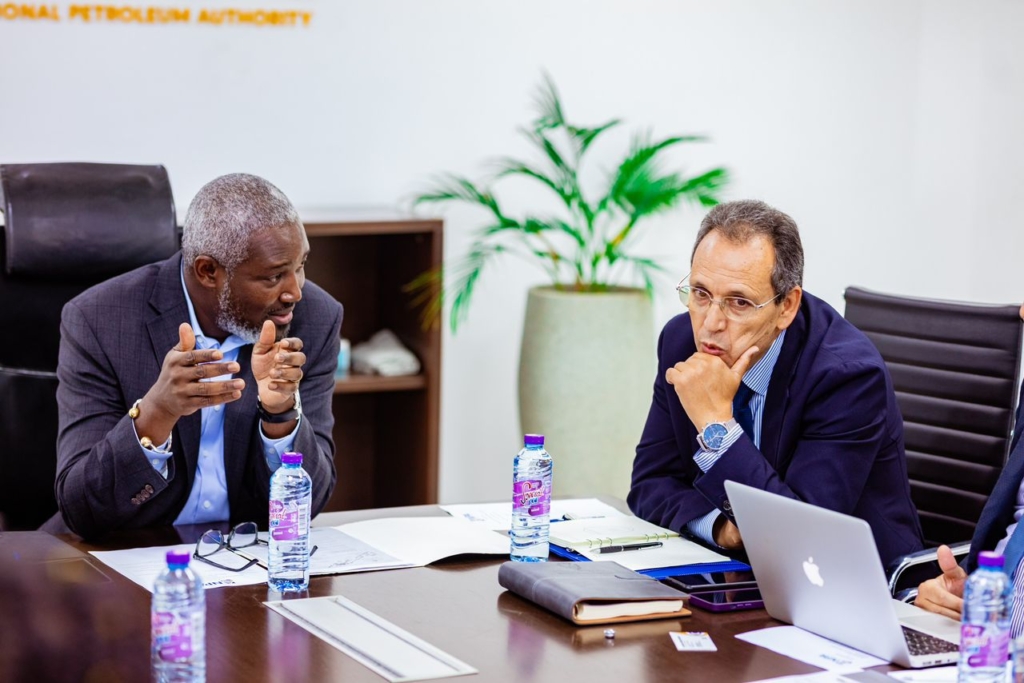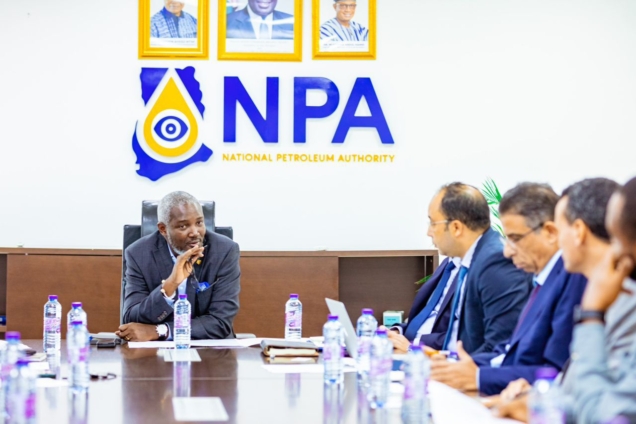
Audio By Carbonatix
A four-member delegation from the Moroccan Ministry of Energy Transition and the Customs and Indirect Administration is in the country to understudy the National Petroleum Authority’s petroleum distribution system relative to tax administration.
The team seeks to have a better insight into the implementation of the Unified Petroleum Price Fund (UPPF), the Bulk Road Vehicle (BRV) Electronic Cargo Tracking System, and the Petroleum Product Marking Scheme (PPMS) in providing revenue assurance to the government.
An arrangement has been made for the delegation to visit the Marker Warehouse and Storage; the Depot Marking operations; the BRV Operations and Sealing of Trucks; the NTL Laboratory, and also observe the testing of petroleum products at selected retail outlets to have hands-on experience in their operations.

The delegation is led by the Director of Customs and Indirect Taxes Administration, Chafik Essalouh, with Montassir Laksiri, Customs Division; Mohsinne Zaydi of the Ministry of Energy Transition, and Elmoutadikic Ahmed, a representative of the petroleum companies in Morocco as members.
Welcoming the delegation at the NPA in Accra on Monday, June 17, 2024, on behalf of the NPA, the Chief Executive, Dr. Mustapha Abdul-Hamid, a Deputy Chief Executive of NPA, Perry Okudzeto, said the NPA was ready to share its experiences with Morocco.
He said the country depended on the importation of petroleum products as only three refineries were operational in the country at the moment.
He said if Sentuo Refinery with 40,000 barrels per day capacity settles down, and the Tema Oil Refinery (TOR) resumes operations, their productions would cater for about 40 percent of the country’s demands.
Mr. Okudzeto said the NPA and the Ghana Revenue Authority (GRA) had deployed officers at the petroleum facilities to test the quality of products, check the volumes, and ensure that all petroleum products are accounted for and the right taxes and levies are calculated.
Mr. Okudzeto said the NPA and the GRA had integrated their systems so that whatever is done in the NPA’s system is seen by the GRA and vice versa.
Mr. said the PPMS, which has to do with the marking of petroleum products, ensures the integrity of petroleum products. At the same time, the BRV Electronic Cargo Tracking System tracks the movement of fuel tankers to prevent diversion.
Responding, Mr. Essalouh said the delegation was ready to learn about Ghana’s tax regime on petroleum products and consider the possibility of integrating into the Moroccan tax system
Latest Stories
-
AMA kerb and median repainting gains momentum across Accra
3 minutes -
Pray for government as we work to deliver development – Interior Minister
8 minutes -
Ghana CEO summit marks 10 years of impact, sets sights on economic transformation
13 minutes -
Gov’t records 33% oversubscription of T-bills for the 3rd week running
24 minutes -
Leukaemia, Last Chance Abroad: Bone Marrow Transplant Centre to cost Ghana $11m – Leukaemia Foundation Project
27 minutes -
TAGG hails government for scrapping COVID-19 levy
45 minutes -
5 Ghanaian artistes to look out for in 2026
53 minutes -
Ghana needs $10m to build world-class Leukaemia Treatment Centre – Leukaemia Project Foundation
55 minutes -
Adelekezu residents burn six vehicles, destroy mining company’s property after boy’s death
56 minutes -
Colombian Vice President leads business delegation to GPHA to explore investment opportunities
59 minutes -
TCDA to establish 16,000 hectares of tree crop enclaves across all 16 regions
2 hours -
Pending applications won’t halt Kpandai parliamentary rerun – Kwame Akuffo
2 hours -
Adwoa Safo says her political future lies with Bawumia rather than Kennedy Agyapong
2 hours -
Black Stars to face Germany in pre-World Cup friendly on March 30
2 hours -
Hiving off AG’s powers to OSP without amending Article 88 is unconstitutional – Kwame Akuffo
2 hours

